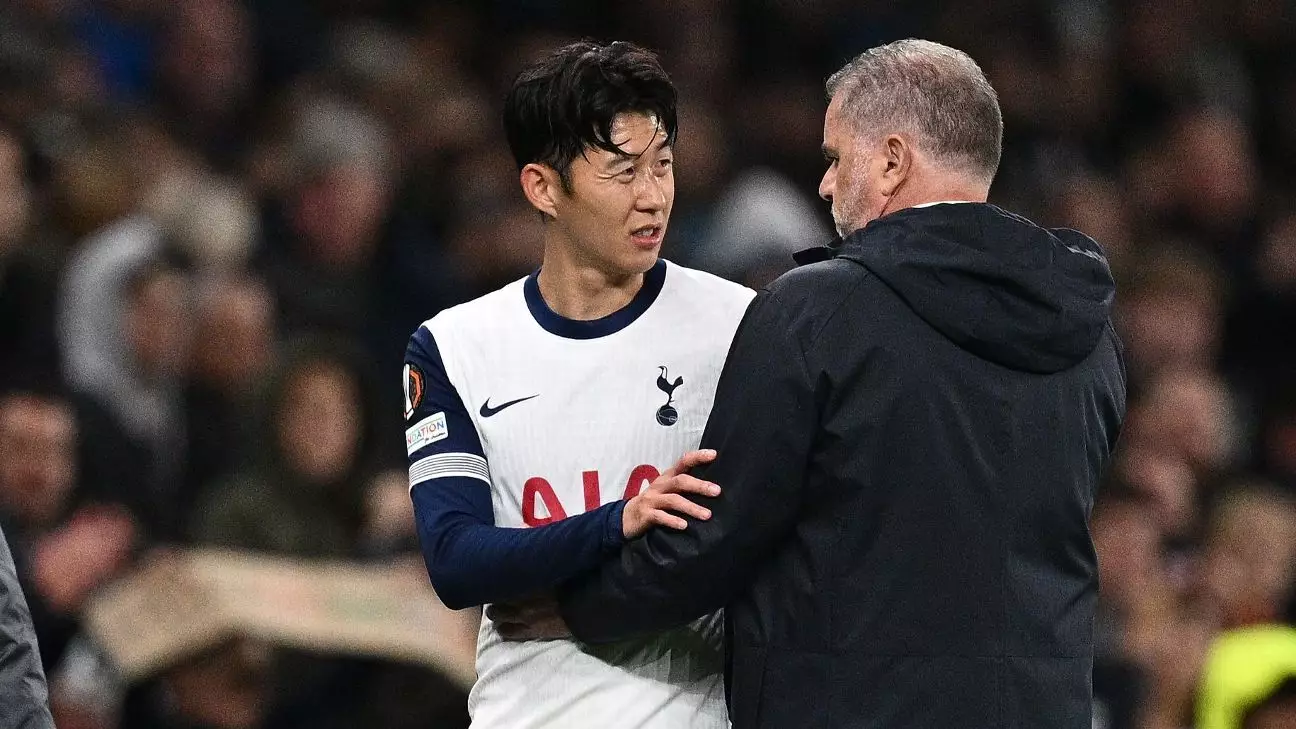In the high-octane world of professional football, where the spotlight shines brightly on athletes, the pressure to perform consistently is immense. For clubs like Tottenham Hotspur, this pressure is compounded by the demands of domestic and international competitions. Recently, Tottenham’s head coach, Ange Postecoglou, addressed the unsustainable burden being placed on star forward Son Heung-Min, emphasizing the need to manage player fatigue judiciously.
Workload and Sustainability: A Growing Concern
Ange Postecoglou’s candid remarks regarding Son’s workload raise important questions about player sustainability in modern football. Son, a critical component of Tottenham’s attacking dynamics, has logged more minutes on the pitch than anticipated since the beginning of the season. At 32 years old, the discussion around his fitness levels and on-field availability becomes increasingly pertinent amidst a packed schedule that includes EPL matches and European fixtures.
Postecoglou acknowledged the pressing reality that with injuries to other key players — Richarlison, Dominic Solanke, and Wilson Odobert — the team has had to rely more heavily on Son. This reliance is problematic, especially considering Son’s commitment to both club and country. His dedication to playing every match can lead to significant risk, not just for his performance levels, but also for his health.
The Risks of Overexertion
As Son navigates the rigors of the season, he has experienced physical setbacks, culminating in a hamstring issue that forced him to exit a Europa League match early. Postecoglou has aptly pointed out that while Son’s competitive spirit drives him to play, it is crucial to consider the player’s wellbeing in the face of extensive fixture congestion.
Elite athletes are often trapped in a paradox: their drive for excellence is counterbalanced by the looming threat of injury. Son himself remarked on the increasing difficulty of managing the sheer volume of matches, hinting at the psychological and physical toll it takes on players. The consensus within the sporting community is shifting towards prioritizing player health, emphasizing that keeping athletes injury-free may enhance their long-term contributions to the sport.
Another critical aspect raised by Postecoglou pertains to the mentality of elite athletes like Son. These players are wired to perform, often exuding an eagerness that makes it challenging for them to step back voluntarily. The coach succinctly encapsulated the issue — it is not merely a matter of age but rather the intensity of the modern fixture schedule that stresses the need for careful management.
The goal of a coach should align with the player’s desire to perform while also ensuring that their capabilities are sustainably maximized. Postecoglou’s reluctance to have drawn-out discussions over workload with Son unveils the reality of high-stakes decision-making in football. Oftentimes, coaches must prioritize player management over the players’ immediate desires to participate.
Moreover, Son’s position as the star of the South Korean national team complicates matters further. Players like Son have a deep connection with their national teams, which underscores their commitment to donning their country’s colors, irrespective of club pressures. Postecoglou’s stance reinforces an important principle: it is imperative not to diminish a player’s national pride for the sake of club needs.
The notion of advising a player to step back from international duties invites discussion about individuality in sports; professionals have varied perspectives of success and desire. For Son, representing South Korea is likely just as important as his contributions to Tottenham. Thus, navigating this delicate balance becomes essential for both the coaching staff and the player.
The debate around player workload, especially highlighted through the lens of Son Heung-Min’s situation, calls for a broader examination of the modern football landscape. The trend toward heavy scheduling and fixture congestion presents unique challenges that must be addressed with a careful approach to player management.
Coaches like Ange Postecoglou are tasked with making tough decisions that prioritize both team success and player health. As leaders in their respective clubs, they need to embrace a culture that enhances player wellbeing without compromising competitive integrity. Ultimately, the aim should revolve around fostering an environment where athletes can thrive physically and mentally while cherishing the unique memories that their careers offer. In a sport where the clock constantly ticks down, this balance is not just desirable; it is essential.

